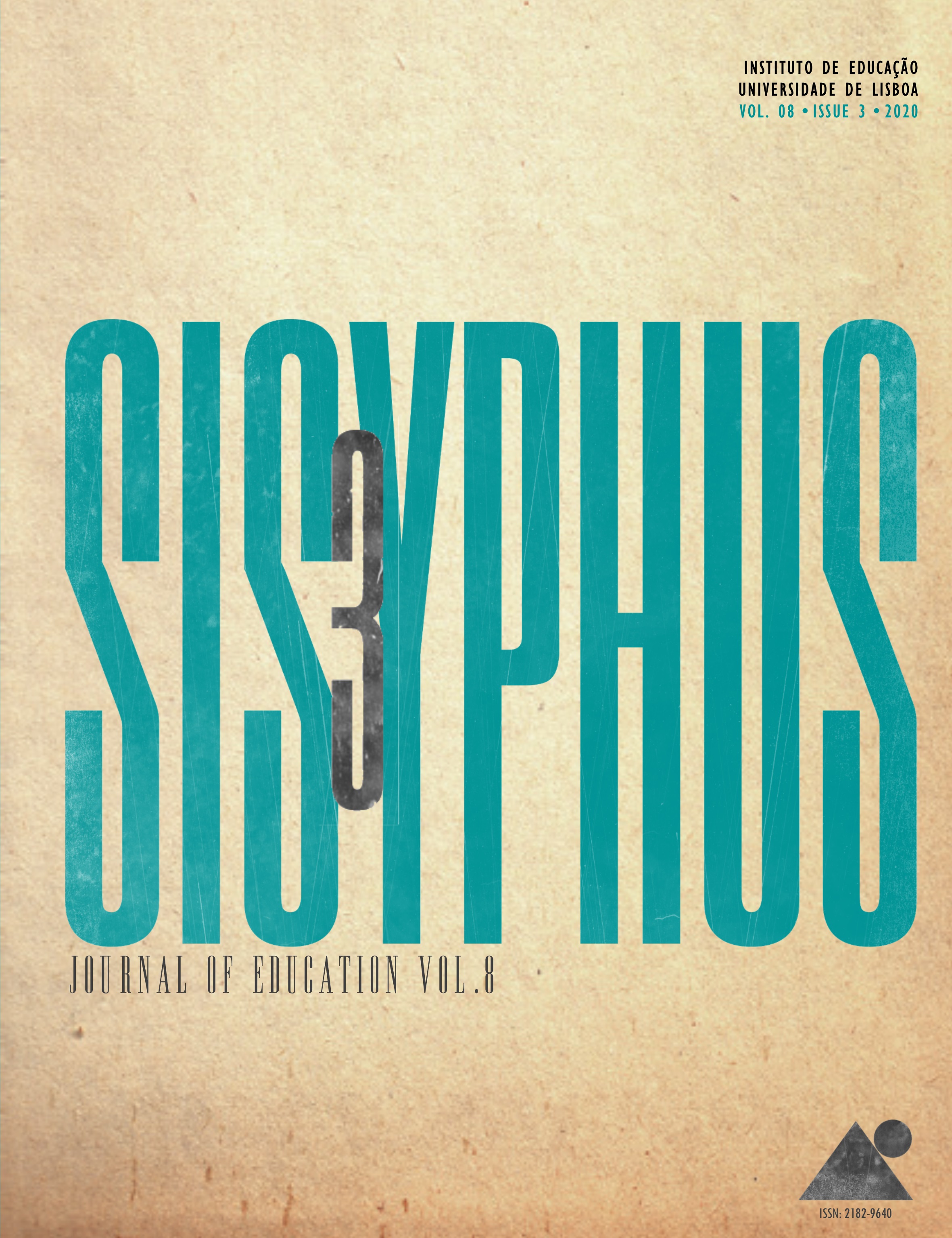La Experiencia de la Educación en la Era de la Antipolítica
Leyendo a John Dewey en la Tercera Década del Siglo XXI
DOI:
https://doi.org/10.25749/sis.19986Palabras clave:
disposición, instrumentalismo, antipolítica, democracia, educación, raza, las artesResumen
El argumento de Dewey sobre la educación se basa en que, como seres libres e inteligentes, tenemos el poder de desarrollar disposiciones. Pero en un contexto donde la antipolítica ha esterilizado la democracia, leer a Dewey revela una necesidad urgente de revisar su método de experiencia y experimentación. Revisando la crítica de Horkheimer de Dewey, que revela dos nociones opuestas de instrumentalismo, este ensayo descubre que a menos que Dewey sea reevaluado por el carácter non-identitario de su pragmatismo, es probable que su filosofía de la educación se ajuste al constructivismo social, donde el método Deweyano estará propenso a lo que Maxine Greene llama una disyunción en la cultura entre la vida cotidiana y la razón donde se desvanecen las “integraciones” que Dewey valora en la noción de experiencia. Aquí se hace referencia a la discusión de Lorraine Hansberry y James Baldwin sobre una democracia que se parece más a una “casa en llamas” que a una forma de vida asociada.
Descargas
Citas
BALDACCHINO, J. (2009). Education Beyond Education. Self and the imaginary in Maxine Greene’s philosophy. New York: Peter Lang.
BALDACCHINO, J. (2014). John Dewey. Liberty and the Pedagogy of Disposition. Dordrecht, New York: Springer.
BALDWIN, J., CAPOUYA, E., HANSBERRY, L., HENTOFF, N., HUGHES, L., & KAZIN, A. (1961). The Negro in American culture. Cross Currents, 11(3), 205-224.
BERLIN, I. (1998). Two Concepts of Liberty. In H. HARDY & R. HAUSHEER (Eds.), The Proper Study of Mankind. An Anthology of Essays (pp. 191-242). London: Pimlico.
BERNSTEIN, R. J. (1966). John Dewey. Atascadero: Ridgeview.
BOBBIO, N. (1995a). Il Futuro della Democrazia. Torino: Einaudi.
BOBBIO, N. (1995b). Stato Governo e Società. Torino: Einaudi.
BUNZEL, J. H. (1967). Anti-politics in America; reflections on the anti-political temper and its distortions of the democratic process. New York: Knopf.
CAMUS, A. (1991). The Myth of Sisyphus and Other Essays. New York: Vintage.
COLLINGWOOD, R. G. (1999). The New Leviathan: Or Man, Society, Civilization and Barbarism. Oxford: Oxford University Press.
CROCE, B. (1907). Ciò che è vivo e ciò che è morto della filosofia di Hegel. Laterza
DEWEY, J. (1893). The superstition of necessity. The Monist, 3(3) (April), 362-379.
DEWEY, J. (1896). The reflex arc concept in psychology. The Psychological Review, 3(4) (July), 357-370.
DEWEY, J. (1953). Essays in experimental logic. New York: Dover Publications.
DEWEY, J. (1958). Experience and Nature. New York: Dover Publications.
DEWEY, J. (1966). Democracy and Education. New York: The Free Press.
DEWEY, J. (1984). Individualism Old and New. Amherst NY: Prometheus Books.
DEWEY, J. (1989). Freedom and Culture. Amherst NY: Prometheus Books.
DEWEY, J. (1997). Experience and Education. New York: Touchstone.
DEWEY, J. (2000). Liberalism and Social Action. Amherst NY: Prometheus Books.
GIROUX, H. A., & BHATTACHARYA, D. (2017). Anti-politics and the scourge of authoritarianism. Social Identities, 23(5), 503-517. DOI: https://doi-org.ezproxy.library.wisc.edu/10.1080/13504630.2016.1219145
GREENE, M. (1973). Teacher as Stranger. Educational philosophy for the modern age. Belmont CA: Wadsworth Publishing.
GREENE, M. (1988). The Dialectic of Freedom. New York: Teachers College Press.
HICKMAN, L. A., NEUBERT, S., & REICH, K. (Eds.) (2009). John Dewey between pragmatism and constructivism. New York: Fordham University Press.
HOBBES, T. (1982 [1651]). Leviathan. London: Penguin.
HORKHEIMER, M. (1974). Eclipse of Reason. New York: Continuum.
HORKHEIMER, M. (2012). Critique of instrumental reason. New York: Verso.
JACOBS, B., & LAUGHLAND, O. (2017, August 16). Charlottesville: Trump reverts to blaming both sides including ‘violent alt-left’. The Guardian. Retrieved 25 April 2020, from: https://www.theguardian.com/us-news/2017/aug/15/donald-trump-press-conference-far-right-defends-charlottesville
RETTER, H. (2012). Dewey’s progressive education, experience and instrumental pragmatism with particular reference to the concept of Bildung. In P. SILJANDER, A. KIVELÄ & A. SUTINEN (Eds.), Theories of Bildung and growth. Connections and controversies between continental educational thinking and American pragmatism (pp. 281-302). Rotterdam: Sense Publishers.
RORTY, R. (1980). Philosophy and the Mirror of Nature. London: Blackwell.
RORTY, R. (1982). Consequences of Pragmatism. University of Minnesota Press.
RORTY, R. (1990). Contingency Irony and Solidarity. Cambridge University Press.
RUITENBERG, C. (2011). The trouble with dispositions: a critical examination of personal beliefs, professional commitments and actual conduct in teacher education. Ethics & Education, 6(1), 41-52. DOI: https://doi-org.ezproxy.library.wisc.edu/10.1080/17449642.2011.587347
SINDERBRAND, R. (2017, January 22). How Kellyanne Conway ushered in the era of ‘alternative facts’. The Washington Post. Retrieved from: https://www.washingtonpost.com/news/the-fix/wp/2017/01/22/how-kellyanne-conway-ushered-in-the-era-of-alternative-facts/
SKINNER, Q. (1998). Liberty Before Liberalism. Cambridge University Press.
SKINNER, Q. (2002). A Third Concept of Liberty. In London Review of Books. 24(7)4, 16-18.
VICO, G. (2000 [1744]). New Science. London: Penguin.
Descargas
Publicado
Número
Sección
Licencia
Copyright (c) es propiedad de Sisyphus – Journal of Education. Sin embargo, alentamos que los artículos publicados en la revista se publiquen en otro lugar, siempre que se solicite el permiso de Sisyphus y los autores incorporen nuestra cita original y un enlace a nuestra página web.
Política de Autoarchivo
Los autores pueden autoarchivar la versión final publicada de sus artículos en repositorios institucionales, temáticos o páginas web personales e institucionales.
Suscriptor de DORA
El Instituto de Educação de la Universidade de Lisboa, editor de Sisyphus, es uno de los suscriptores de la Declaración de San Francisco sobre la Evaluación de la Investigación (DORA).





